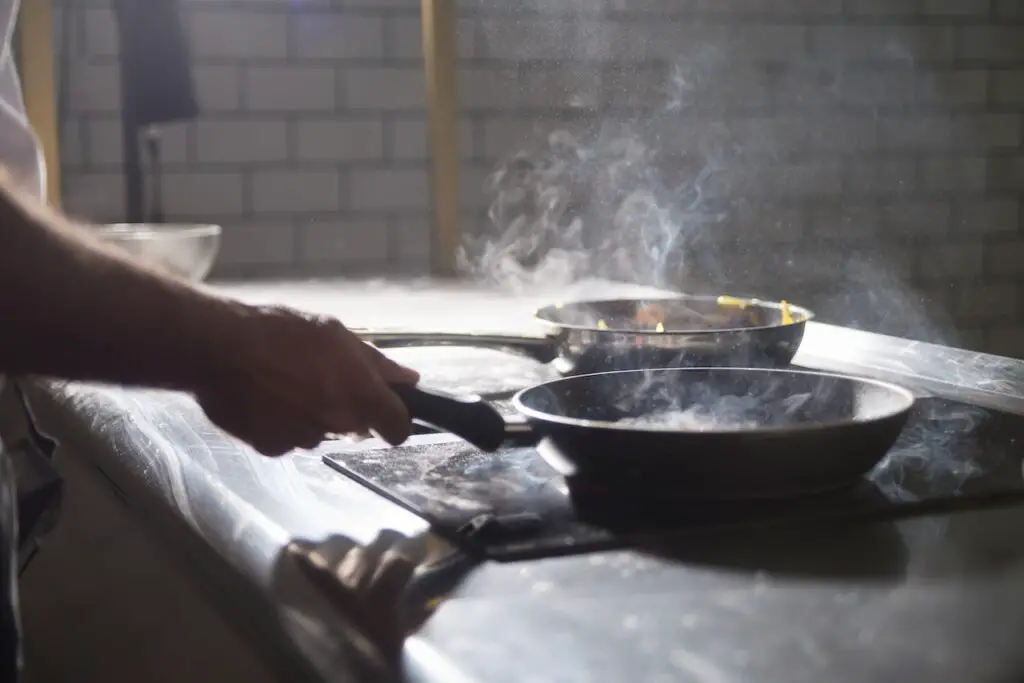As the popularity of electric stoves continues to rise, it’s only natural for homeowners and renters alike to wonder about the safety of these appliances. While gas stoves are often associated with the risk of explosions, the question remains: Can electric stoves explode?
In this article, we will delve into the inner workings of electric stoves, addressing common concerns and shedding light on whether or not they pose a risk of explosion. Whether you’re a seasoned chef or an avid cook, understanding the potential hazards of electric stoves is crucial for maintaining a safe and secure kitchen environment.
So let’s dive in and explore the fascinating world of electric stoves to uncover the truth behind the question, “Can electric stoves explode?”
Table of Contents
How Does Electric Stove Work:

Electric stoves have become a common and convenient choice for cooking in many households. These innovative appliances use electrical energy to generate heat for cooking various dishes. We can appreciate their efficiency and safety by understanding how electric stoves work.
When you turn on an electric stove burner, the first step is connecting to an electrical outlet. This connection provides the necessary power to activate the stove’s heating elements. These heating elements are usually made of a durable material like metal, which can withstand the high temperatures required for cooking.
Once the burner is activated, an electric current starts flowing through the heating element. The flow of electricity works as a catalyst, transforming electrical energy into heat energy. As the current passes through the heating element, it encounters resistance, causing it to heat rapidly.
The heat generated by the heating element then transfers to the cookware placed on the burner. This transfer occurs through conduction, where the heat energy moves from the hot heating element to the cooler cookware. The cookware, in turn, distributes the heat evenly to the food inside.
It’s important to regulate the temperature of an electric stove burner to achieve the desired cooking outcomes. Most electric stoves have control knobs or digital displays that allow users to adjust the electrical energy supplied to the heating element. Turning the control knob or using the digital interface can increase or decrease the burner’s heat output.
When you increase the electrical energy supplied to the heating element, the burner’s temperature rises accordingly. This higher temperature results in faster cooking times or allows for intense heat for cooking techniques such as searing or boiling. Conversely, decreasing the electrical energy supplied to the heating element reduces the burner’s temperature, which is useful for simmering or keeping food warm.
Electric stoves offer several advantages over other types of stoves. They are known for their precise temperature control, allowing for more accurate cooking and reducing the overheating risk. Additionally, electric stoves are often considered safer since no open flame is involved, decreasing the chances of accidental fires or gas leaks.
Can Electric Stoves Explode? [Detailed Answer]

The short answer is that electric stoves are not known for exploding like their gas counterparts. Unlike gas stoves that rely on a combustible fuel source, electric stoves use electricity to generate heat through heating elements. This fundamental difference significantly reduces the risk of gas leaks and ignition explosions.
Electric stoves are designed with safety mechanisms to prevent hazardous situations. One such mechanism is a thermal fuse or temperature limiter, which monitors the stove’s temperature. If it exceeds a certain limit, the fuse shuts off the power to prevent overheating and potential damage. This safety feature helps mitigate the risk of explosions caused by excessive heat.
It’s important to note that electric stoves may not explode, but they can still pose certain safety hazards if not used properly. One common issue is electrical fires, which can occur due to faulty wiring, damaged heating elements, or appliance misuse. To minimize this risk, it’s crucial to ensure the stove is installed correctly and maintained regularly.
Another potential hazard is grease and food debris buildup on the stove’s surface and in the drip pans. If left uncleaned, these substances can catch fire when exposed to high heat. Regular cleaning and proper maintenance are essential to prevent such incidents.
In rare cases, a faulty electrical component or a manufacturing defect may lead to a malfunction that could cause an electric stove to emit sparks or catch fire. However, it’s important to remember that such incidents are relatively uncommon and usually not as catastrophic as gas explosions.
Following some basic guidelines is advisable to enhance safety further when using electric stoves. Never leave the stove unattended while in use, and always turn it off after cooking. Keep flammable materials away from the stove, and ensure proper ventilation in the kitchen to prevent the accumulation of heat and fumes.
5 Reasons Why Electric Stoves Can Explode:

There are five reasons why electric stoves can explode:
1. Overheating
Electric stoves generate heat through heating elements designed to reach high temperatures. If these elements are subjected to excessive heat for an extended period, they can overheat and potentially lead to an explosion. This can occur due to prolonged use, lack of ventilation, or a malfunctioning thermostat. Use your electric stove within the recommended time limits and ensure proper airflow around the appliance.
2. Faulty Wiring
Electrical appliances rely on a complex system of wiring to function safely. However, if the wiring within your electric stove is faulty or damaged, it can increase the risk of an explosion. Over time, wear and tear can cause wires to fray or become loose, creating a potential fire hazard. Regularly inspecting the wiring and promptly addressing any signs of damage or malfunction can significantly reduce the risk of an explosion.
3. Poor Maintenance
Refrain from regular maintenance of your electric stove to avoid various issues that may eventually result in an explosion. Accumulating grease, food particles, or other debris can obstruct the airflow and cause the appliance to overheat. Additionally, failure to clean the stove’s burners, coils, or heating elements can affect their efficiency, potentially leading to dangerous situations. Adopting a routine cleaning schedule and following the manufacturer’s guidelines for maintenance is crucial to minimize the risk of an explosion.
4. Incorrect Installation
Improper installation of an electric stove can be a significant factor in potential explosions. If the stove is not correctly connected to the power source or the electrical wiring is not installed according to the manufacturer’s instructions, it can lead to electrical faults and overheating. Hiring a professional electrician experienced in appliance installations is advisable to ensure a safe installation.
5. Defective Components
In some cases, electric stoves may contain defective or substandard components that can pose a safety risk. These faulty parts can result in electrical malfunctions, such as short circuits or excessive heat generation, ultimately leading to an explosion. When purchasing an electric stove, it is crucial to choose a reputable brand and check for any recalls or known issues with the model you intend to buy.
Tips to Avoid an Explosion in Electric Stove:

There are five tips that can help you to avoid an explosion on an electric stove:
1. Regular Maintenance
Proper maintenance is key to preventing potential issues that can lead to an explosion. Regularly inspect your electric stove for any wear, damage, or malfunction. Check the wiring, heating elements, and controls for frayed wires, loose connections, or other issues. Clean the stove regularly to remove grease, food debris, and other flammable substances that can increase the risk of overheating. Keeping your electric stove in good working condition can minimize the chances of an explosion.
2. Adequate Ventilation
Ensure that your electric stove has proper ventilation to dissipate heat effectively. Poor ventilation can cause the stove to overheat, leading to potential explosions. Avoid blocking the vents or placing any objects on or near the stove that can obstruct airflow. If the area around your stove becomes excessively hot during use, consider installing a range hood or using a portable fan to improve air circulation. Adequate ventilation helps maintain safe operating temperatures and reduces the risk of an explosion.
3. Responsible Use
Using your electric stove responsibly is essential to prevent accidents. Never leave your stove unattended while cooking, especially when using high heat settings. Avoid placing flammable items such as towels, paper, or plastic near the stove, as they can ignite and cause an explosion. It’s also important to avoid overloading the stove by placing heavy or oversized pots and pans on the burners, as this can strain the appliance and potentially lead to malfunctions. Responsible use and monitoring can go a long way in preventing stove explosions.
4. Professional Installation
Proper installation of your electric stove is crucial for its safe operation. If you need to become more experienced with electrical work, hiring a professional electrician to handle the installation process is best. They will ensure that the stove is correctly connected to the power source and that the electrical wiring is done according to the manufacturer’s guidelines. Improper installation can result in electrical faults, short circuits, and stove explosions. Invest in professional installation to minimize risks.
5. Stay Updated
Stay informed about product recalls, safety alerts, or manufacturer recommendations regarding your electric stove model. Manufacturers occasionally identify potential product issues or defects and provide instructions for addressing them. Regularly check the manufacturer’s website or subscribe to their email notifications to receive updates. By staying updated, you can take necessary actions promptly to avoid any potential explosion risks associated with your electric stove.
Factors To Consider When Purchasing An Electric Stove:
There are five factors that you consider when purchasing a new electric stove:
1. Thermostat
When purchasing an electric stove, it’s crucial to consider models with a thermostat. This feature ensures the cooking surface doesn’t become excessively hot, reducing the risk of accidents or burns. A thermostat-regulated stove provides peace of mind and adds more safety to your cooking experience.
2. Cool-to-the-touch Surface
Look for an electric stove that features a cool-to-the-touch surface. This attribute is particularly important for households with children or pets. You minimize the risk of accidental burns by opting for a stove with a relatively cool surface, even during cooking. Testing the surface temperature before purchasing can help ensure it meets your safety expectations.
3. Additional Safety Features
Beyond the thermostat and cool-to-the-touch surface, it’s worth checking if the electric stove offers any other safety features. Automatic shutoff is a valuable feature that turns off the stove if left unattended for an extended period. Self-cleaning functionality reduces the risk of fires caused by food debris, while an automatic ignition system eliminates the need for matches or lighters, reducing the risk of accidental fires.
4. Ease of Cleaning
Cleaning an electric stove should be a hassle-free task. Smooth glass cooktops are easier to clean than traditional coil cooktops, as they provide a flat surface without crevices where food particles can accumulate. Look for models with sealed burners, as they prevent spills from seeping into the interior components, making cleanup easier and prolonging the stove’s lifespan.
5. Energy Efficiency
Energy efficiency is an important consideration when buying an electric stove. Look for stoves with high energy efficiency ratings, as they consume less electricity and help lower your utility bills. Models with variable-sized burners are also advantageous since they allow you to match the burner size to the pot or pan, minimizing wasted heat and energy.
How Often Do Electric Stoves Explode?

Electric stoves provide a convenient and efficient way to cook our meals, but like any appliance, they have risks. While we often associate explosions with gas leaks, electric stoves can also be dangerous under certain circumstances. Electric stoves are more prone to explosions than their gas counterparts due to the intense heat they generate. Between 2000 and 2010, approximately 1,000 injuries in the United States were attributed to exploding electric stoves, compared to just over 200 for gas stoves.
Most electric stove explosions occur due to food or grease accumulation on the stovetop or burner plates. Over time, through regular cooking or accidental spills, these substances can build up and create a potentially hazardous situation. When these materials come into contact with the high heat produced by the electric stove, they can ignite and set off a chain reaction that leads to an explosion.
It is essential to understand that electric stove explosions are relatively rare occurrences, and most incidents can be prevented by following proper maintenance and safety practices. Regular cleaning and care of your electric stove can decrease the risk of an explosion. Ensure you regularly clean the stovetop and burner plates to remove food residue or grease buildup.
Avoid letting food or grease accumulate on the stovetop or burner plates when cooking. If a spill occurs, clean it up promptly to prevent it from drying and becoming a potential ignition source. Use appropriate cookware that fits the burner size to prevent any overflow or spillage that could lead to an explosion.
In the event of an explosion, it is crucial to prioritize your safety and the safety of those around you. If you suspect a problem with your electric stove, such as a strange smell or unusual sounds, immediately turn off the stove and disconnect it from the power source. Evacuate the area and contact emergency services if necessary.
What To Do If Electric Stove Catches Fire?

If you find yourself in a situation where your electric stove catches fire, it is crucial to act quickly and effectively to prevent the fire from spreading and causing further damage. Here are the steps you should take:
1. Unplug the stove
The first and most important step is disconnecting the stove from its power source. Reach for the plug and remove it from the outlet. By cutting off the electricity supply, you eliminate the risk of the fire being fueled and potentially worsening.
2. Call the fire department
Even if you believe you can handle the fire independently, it is always wise to call the fire department immediately. Inform them about the situation and provide your location. Having professional firefighters on the way will ensure you have a backup in case the fire becomes uncontrollable.
3. Assess the fire
While waiting for the fire department to arrive, take a moment to assess the size and intensity of the fire. If it is a small fire and you feel confident in your ability to extinguish it safely, you can proceed cautiously.
4. Use baking soda
Baking soda can be effective in smothering small electrical fires. Grab a box or container of baking soda and carefully sprinkle it onto the flames. The baking soda releases carbon dioxide when heated, which helps to suffocate the fire and suppress the flames. Avoid using water or flour as they can worsen the fire or cause electrical shock.
5. Keep a fire extinguisher nearby
A readily available fire extinguisher in your kitchen is always a good idea. If the fire is too large to handle with baking soda or you do not feel confident in extinguishing it yourself, use the fire extinguisher following the instructions. Aim the extinguisher at the base of the flames and sweep it back and forth until the fire is fully extinguished.
6. Evacuate and wait for professionals
If the fire continues to grow despite your efforts or if you feel unsafe at any point, evacuate the area immediately. Close any doors behind you to contain the fire as much as possible, and wait for the fire department to arrive. Your safety is paramount, so do not hesitate to exit the premises if the situation warrants it.
Remember, the safety of yourself and others should always be the top priority in the event of a fire. Act swiftly, follow these steps, and rely on professional assistance to resolve the situation safely and efficiently. Regular maintenance and practising good safety habits can also help prevent fires from occurring in the first place.
Also Read: Are Natural Gas and Propane Interchangeable
Conclusion:
At the end of this article, we have explored the question, “Can electric stoves explode?” and identified five reasons why electric stoves can pose a risk of explosion. While electric stoves are generally considered safer than gas stoves, it is important to be aware of the potential dangers and take necessary precautions.
From electrical malfunctions to improper installation, lack of maintenance, overheating, and the buildup of food or grease, these factors can contribute to an electric stove explosion’s rare but possible occurrence. We can minimise the likelihood of such incidents by understanding these risks and implementing proper safety measures such as regular cleaning, maintenance, and prompt action in the event of a fire.
Remember, prioritizing safety and staying informed is essential when using any kitchen appliance, including electric stoves.
FAQs
Can Electric Stoves Have Flames?
No, electric stoves do not have actual flames. They generate heat through electric coils or induction technology, eliminating the need for open flames commonly found in gas stoves.
Is It Safe To Leave The Electric Stove On Overnight?
No, it is not safe to leave an electric stove on overnight. It poses a fire hazard and increases the risk of accidents. Always turn off the stove when not in use, and never leave it unattended for extended periods.
Can Electric Stoves Overheat?
Yes, electric stoves can overheat if used for prolonged periods or if there is a malfunction. Overheating can damage the stove, pose a fire hazard, or trip the circuit breaker. It’s important to follow safety guidelines and monitor the stove’s usage to prevent overheating.



